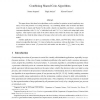Free Online Productivity Tools
i2Speak
i2Symbol
i2OCR
iTex2Img
iWeb2Print
iWeb2Shot
i2Type
iPdf2Split
iPdf2Merge
i2Bopomofo
i2Arabic
i2Style
i2Image
i2PDF
iLatex2Rtf
Sci2ools
JPDC
2010
2010
Combining shared-coin algorithms
This paper shows that shared coin algorithms can be combined to optimize several complexity measures, even in the presence of a strong adversary. By combining shared coins of Bracha and Rachman [10] and of Aspnes and Waarts [7], this yields a shared coin algorithm, and hence, a randomized consensus algorithm, with O(n log2 n) individual work and O(n2 log n) total work, using single-writer registers. This improves upon each of the above shared coins (where the former has a high cost for individual work, while the latter reduces it but pays in the total work), and is currently the best for this model. Another application is to prove a construction of Saks, Shavit, and Woll [16], which combines a shared coin algorithm that takes O(1) time in failure-free executions, with one that takes O(log n) time in executions where at most √ n process fail, and another one that takes O( n3 n−f ) time in any other execution.
Related Content
| Added | 28 Jan 2011 |
| Updated | 28 Jan 2011 |
| Type | Journal |
| Year | 2010 |
| Where | JPDC |
| Authors | James Aspnes, Hagit Attiya, Keren Censor |
Comments (0)

